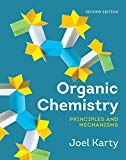
Concept explainers
Interpretation:
Out of the four given molecules, the molecules that are carbohydrates and monosaccharides are to be determined.
Concept introduction:
Carbohydrates are also called saccharides. Carbohydrates are characterized by their chemical composition. Carbohydrates are composed of only carbon, oxygen, and hydrogen. Regardless of how many carbon atoms are present, there are two hydrogen atoms for every oxygen atom; thus, the molecular formula for carbohydrates is
Want to see the full answer?
Check out a sample textbook solution
Chapter 1 Solutions
Organic Chemistry: Principles and Mechanisms (Second Edition)
- Which of the following structures is an E isomer? Use image as referencearrow_forwardCompound F: Compound A Compound Compound C Compound D Compound E Compound F H-C-OH H-C-OH H-C-OH H [Choose ] [Choose ] [Choose ] H [Choose ] [Choose ] [Choose ] < <arrow_forwardProblem: Following are the alternative chair conformations for trans-1,4-dimethylcyclohexane.arrow_forward
- Problem: (a) Draw six (6) constitutional isomers of C6H1202. (b) Which of the compounds you drew would be the most soluble in water? Explain your choice. (c) Which of the compounds you drew would be the most soluble in hexane? Explain your choice.arrow_forwardwhich is the eclipsed conformationarrow_forwardProblem: Use the molecules below to answer the questions. (a) List one pair of enantiomers, if any. (b) List one pair of diastereomers, if any. (c) List one meso compound, if any. (d) How many total configurational isomers are possible for compound 2? онно CH 3 он но H QH H CH3 CH 3 CH3 H OH но. „CH3 H он H H. "CH 3 H H "CH3 H H3C H3C 4 3 1arrow_forward
- Provide the common name for the condensed formula shown herearrow_forwardhow all six atoms in ethene is in the same plane?arrow_forwardProblem: Perform a conformational analysis 2-iodo-2-methylbutane, looking down the C2-C3 bond. Pay attention to the relative energies of the various conformations, but do not concern yourself with the actual energy values.arrow_forward
- Problem How many different configurational stereoisomers exist (including the one shown) for each of the following molecules?arrow_forwardDraw the structure of the following molecules that result from the flipping of the existing chair conformation. See attached structures:arrow_forwardDetermine if the following sets of molecules are identical molecules, different molecules, or isomers (if so what kind).arrow_forward
 Organic Chemistry: A Guided InquiryChemistryISBN:9780618974122Author:Andrei StraumanisPublisher:Cengage Learning
Organic Chemistry: A Guided InquiryChemistryISBN:9780618974122Author:Andrei StraumanisPublisher:Cengage Learning Chemistry for Today: General, Organic, and Bioche...ChemistryISBN:9781305960060Author:Spencer L. Seager, Michael R. Slabaugh, Maren S. HansenPublisher:Cengage Learning
Chemistry for Today: General, Organic, and Bioche...ChemistryISBN:9781305960060Author:Spencer L. Seager, Michael R. Slabaugh, Maren S. HansenPublisher:Cengage Learning

